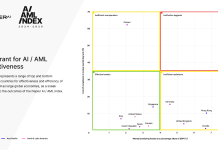Politically Exposed Persons (PEPs) are a key topic of discussion right now. Fenergo recently took the chance to dip deeper on PEPs and the fight against financial crime.
In 2022, the world witnessed financial institutions (FIs) being penalised to the tune of $4.2bn due to breaches in anti-money laundering (AML) regulations, including sanctions and know your customer (KYC) guidelines, marking a substantial 52% increase from the preceding year.
Economic disturbances have amplified fraudulent undertakings, thus making the regulators amplify their plea to FIs to be especially vigilant. Central to this vigilance is the apt identification of a politically exposed person (PEP) – an integral facet of both KYC and AML compliance.
PEPs, due to their status, often instigate concerns related to money laundering and corruption, demanding a heightened layer of examination. Yet, the dilemma arises in accurately categorising someone as a PEP, largely due to the inconsistency in definitions across jurisdictions. Even though there have been refinements in these definitions, pinpointing PEPs remains a formidable challenge.
Recent events brought PEP management into the spotlight when Nigel Farage, UKIP’s ex-leader, revealed that a bank had severed ties with him after a four-decade-long association. Farage labelled this as “serious political persecution”, with the bank citing reputational risks as the primary reason. These incidents spurred discussions on PEP management and the intricacies surrounding banking relationships with public figures.
Financial institutions often grapple with the ramifications of onboarding PEPs. Notable instances from the past year highlight the volatile nature of these relationships, such as the substantial declines in the net worth of billionaires like Roman Abramovich and Gennady Timchenko, largely attributed to sanctions on Russian oligarchs due to geopolitical tensions. Furthermore, high-profile scandals, such as the 1MDB episode involving Goldman Sachs, underscore the monumental risks associated with PEPs.
So, who precisely is a PEP? The definition, although varying slightly between jurisdictions, primarily encompasses individuals holding eminent public roles. The challenge, however, lies in FIs’ ability to carry out comprehensive due diligence, especially regarding the source of wealth, in line with a risk-centric approach.
There exists a disparity in the global definition of PEPs. While the EU broadened its definition under the 4th AML Directive, the US, contrastingly, limits its definition to foreign PEPs. This divergence accentuates the need for more harmonised regulatory collaboration.
To mitigate potential risks, FIs must be proactive in evaluating the dangers of transacting with PEPs. Advanced digital onboarding solutions offer promising avenues to streamline PEP management, further enhanced by graph data visualisation software.
Emphasising the importance of effective client due diligence is paramount, especially when determining political exposure. For FIs in the UK, the focus should be on adhering to updated account closure regulations, following the broader discussions among major banks and the Treasury.
Read the full post here.
Keep up with all the latest FinTech news here.
Copyright © 2023 FinTech Global











